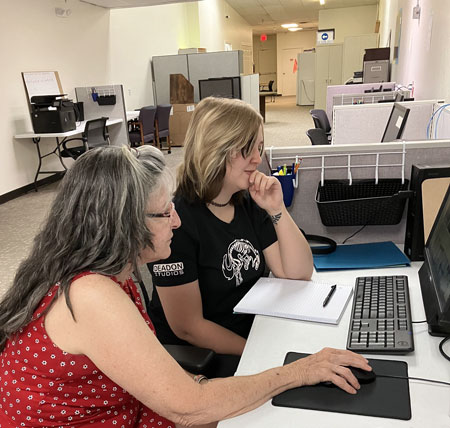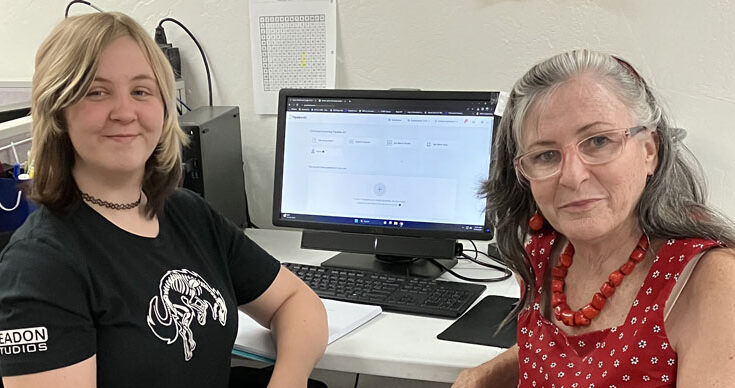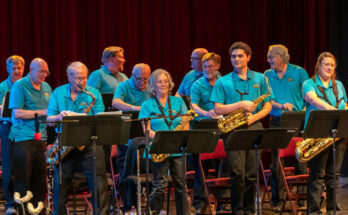Photo courtesy of Director Pat Reynolds, with the Gila County Adult Education Program: Student Kaylie Murphy and instructor Cindy Mitchell research a project as part of her Adult Education/GED program.
Open House set for Wednesday, July 26
Contributed Article By Carol Broeder
PAYSON – A small handful of adult education teachers; two data specialists; three volunteer librarians and one director make up the dedicated team of adult educators in Gila County.
Their goal is helping local adults (16 years and older) earn high school diplomas and forge a better future for themselves, says Director Pat Reynolds, with the Gila County Adult Education Program.
On Wednesday, July 26, Gila County School Superintendent Roy Sandoval will highlight the success of this grassroots program, inviting guests to join him at an open house from 11:30 a.m. to 12:45 p.m., at the Payson Center, 105 E. Highway 260.
Local and State dignitaries are invited, and the public is welcome to attend. Refreshments will be served.
Having just completed a fiscal/academic year, Payson currently has 50 active GED students; 18 ELL (English Language Learners), and 41 Distance Learning students to start the new academic year on Aug. 1.
County-wide registration for new GED and ELL students begins Monday, July 17.
As for GED students, while there are currently about 280 registrations program-wide, approximately half drop out every year due to transportation, childcare, and work schedule issues, Reynolds says.
“We also have an ELL program, which has enrolled about 60 students in the last five years,” she said.
The Adult Education program boasts 740 students and 72 graduates who have earned High School Equivalency (HSE) diplomas in the last five years.
Eleven of those were earned in Payson this year, with 22 graduates in the Gila County program overall.
Describing the “typical” adult education applicant/student in the Payson area, Reynolds says that most work at low-paying jobs and have families.
“The majority are single mothers, who have a higher-than-average drop-out rate due to childcare and transportation issues,” she explained. “Most have attendance patterns of multiple enrollments because they are not able to complete the program in one attempt.”
Low motivation is a “constant challenge,” among students already disenfranchised from school and academics, without goals or plans for their futures.
“We encourage students to re-engage for the sake of their long-term future and work hard to keep them active, especially during the first few months,” Reynolds said. “We offer an online career program as part of our orientation, helping students identify their talents and areas of interest for future job training.”
At the halfway mark, many students become self-motivated seeing proof of their success and knowing they will earn their diploma, she explains.
As to what she wants people to know about their students, Reynolds replied, “Successful adult education students are self-motivated and consider earning their GEDs a priority – like a part-time job with regular hours.”
“They have regular attendance and can finish in 6-9 months – some as little as three months,” she added. “One motivated student recently completed his program in a short 2.5 months and is starting EMT classes.”
Courses are free and, while subject-area GED tests have a fee, scholarship funds are available.
“We have great teachers who create academic plans based on students’ preliminary assessment scores – not everyone starts at the same level,” said Reynolds. “Students typically take one subject area at a time and can focus on subject-specific skills.”
Students are required to commit to at least four hours per week of engagement – either in-person or digitally.
For those unavailable during class hours, there is the Distance Learning program, which often has a waiting list, she explains.
“Most of our students are searching for a path for their future – job training; a career; financial stability and a secure future for themselves and their families—but don’t know how to get there,” Reynolds said.

In 2016, Sandoval received a small grant to cultivate a county-wide GED program for rural Gila County.
His vision was to combat the dismal economic statistics: unplanned pregnancies; unemployment; high-school drop-out rates and low income, she says.
With a ‘second chance’ to earn an HSE and develop job skills, a person moving from one dead-end job to another can change their path and forge a new direction with greater economic stability.
In year three of the current four-year grant, Payson Adult Education is thriving and making a difference–one student at a time, Reynolds says.
Success stories abound – like the newly single mom completing her diploma in just three months; the 16- year-old–unable to read when entering the program two years earlier – completing his diploma knowing how to read and write essays; and the young man who, finishing his last GED test on Friday, appeared for his first shift as an EMT on Monday.
Other stories don’t end so happily–the young mother who had to drop out due to no childcare; the teen with no transportation to the center or the person who had to take a job conflicting with his GED hours, she says.
“Those are missed opportunities that we lament and wish we could counteract,” Reynolds said.
Gila County Adult Education will implement a new ELL program this fall for all proficiencies of English Language Learners.
“Several of our ELL students have advanced degrees from their home countries and want to learn professional-level language,” Reynolds explained. “Others stopped their education at the elementary level and want to become more proficient to be productive members of society.”
“Our new ELL teacher is creating a customized initiative for our diverse students to meet the needs of all proficiencies, using digital as well as face-to-face instruction,” she said.
We are also developing a new focus on workforce/GED studies combining job skills and academics, allowing students to earn nationally recognized licenses and certifications in addition to their HSE diploma, Reynolds explained.
On Wednesday, July 26, Sandoval, Reynolds, and the Payson Adult Education crew would love to show you, “Look what we can do!” offering a brief walk-through opportunity and explanation of the program.
Gila County’s entire program covers 4,800 square miles and is made up of two attendance centers in Globe and Payson; a center in the San Carlos Apache Detention Center; three rural library registration sites and a Distance Learning option.
For more information, contact the Payson Center at 928-472-5284.








